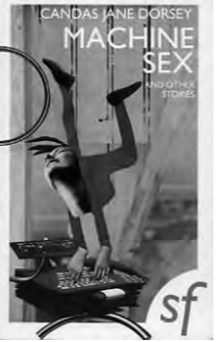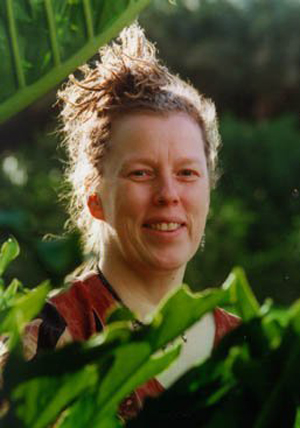By Monica Meneghetti
Integrating one’s sexual identity with a writing life has its challenges. So, I thought I’d seek the wisdom of other bi writers, starting with Candas Jane Dorsey.
Candas is an award-winning, multi-genre writer from Edmonton, Canada. She is also an educator, editor, and past publisher of The Books Collective, River Books, and Tesseract Books. She contributes to her community as a member of the Advisory Committee to the Edmonton Police Service, which addresses the issue of hate and bias crimes. She’s served on the executive of the Writers’ Guild of Alberta and SF Canada, too. I met Candas about fifteen years ago at The Banff Centre for the Arts. Her mentorship has been lifealtering for me. She is outspoken and generous. Her finely-honed bullshit detector and wicked sense of humour are invaluable. She plays a mean Scrabble. She loves Pomeranians. If you bump into her at dim sum, buy her some egg tarts.
Monica Meneghetti: What was your coming out process like? What are your thoughts on the process generally?
Candas Jane Dorsey: I came of age in the late sixties and early seventies, when there was much more fluidity than there was earlier — or later. It was almost the duty of any young free spirit (a.k.a. hippie) to experiment with sexuality and drugs. I didn’t like drugs, so… ! So the sexual understanding came early and without a great deal of angst. Of course I’ve had the ongoing question of what data to reveal to whom, but there was never really a problem with who I was. I just was—and am—who I am. Perhaps I got good advice from Popeye the Sailor Man: “I yam who I yam and that’s all that I am…”! Whatever the reason, I felt and feel quite centered in my identity as a bisexual.
The polyamory thing (I never called it that, just “non-exclusive”) was more of a problem, not in coming out but in the pressures I got from various partners. For their sake, I tried to be exclusive, but it wasn’t logical to me. However, I don’t have any issues like that with my bi partner of almost 18 years, who is non-exclusive also, although we define our relationship as primary and central. We shared a boyfriend for a while, but he was unwilling to commit fully, so we broke up with him, probably just before he broke up with us.
For some people, being queer is the first time they’ve been beyond the white picket fence that defines hetero-normative monogamy. So they have to make it a central organising principle in their lives. They “come out” with a flourish and much fallout in the intolerance of family or community or church or all three, or they hide miserably in the closet with much suicidal angst and then come out to save their lives. They “learn to be gay” as one young man told me he was doing, transforming himself from a Newfie roughneck from the oil patch into a swish young tipped-hair queen. They define themselves by their attire and another, equally rigid set of sub-cultural norms: lesbians dress thus, gay men decorate their houses so, bisexuals haven’t made up their minds yet, etc. These sub-cultural norms replace the majority culture and are as rigidly enforced and adhered to.
Now, I am not belittling the emotional struggle, because I know a lot of the reason why this didn’t happen to me is just luck. But a lot of isolating, interesting, difficult things happened to me—and before I was a sexually active being at that—so I was used to being a solitary and making my own decisions, not going with the cultural norms. Those norms hadn’t helped me as a child or as a teen, so they weren’t likely to attract me as an adult, especially given the attractive alternative of hippie ideology, with its emphasis on freedom, exploration and discovery, self-realisation and self-definition.
MM: Your novel, Black Wine, won the James Tiptree, Jr. Award—the literary prize for science fiction or fantasy that expands or explores our understanding of gender. And many of your short stories leave characters’ genders unspecified. What are some of your thoughts on gender?
CJD: Writing about gender has, by and large, been an accident of my worldview getting into my writing. Gender appears to be a primary datum for most people, queer as well as straight. But it isn’t for me, and that was reflected in the relative lack of importance I gave to providing that datum about my characters to my readers. This led to characters with no gender pronouns, and that led to people reading gender and sex issues into stories about other things. Eventually, that led to some people thinking of me as a radical writer, and in that sense I guess I am. But from my point of view, this is just part of what I write. I’m glad it has swiveled so many people’s minds 180 degrees away from preconceptions, even if only for long enough to know how it feels not to have them! Writers like to have made a difference with their writing.
MM: Your novel, A Paradigm of Earth, was shortlisted for the Spectrum Award and for Canada’s Sunburst Award. In it, an infant alien learns what it is to be human through being raised by a human who happens to be a bisexual, polyamorous woman. So it’s a queering and pacifying of the archetypal “first contact” story. Did you deliberately create a bi/poly protagonist?
CJD: Bi/poly protagonists are the default character for me. I have to think in a very different way to create other characters—heterosexual, monogamous for instance! So the character Morgan arose naturally. The book grew out of my dream about her and the alien.
MM: As the head of a Canadian small press, you fought a censorship battle that followed the publication of Neurotic Erotica by Timothy J. Anderson. How has that experience affected your writing life? MM: As the head of a Canadian small press, you fought a censorship battle that followed the publication of Neurotic Erotica by Timothy J. Anderson. How has that experience affected your writing life?
CJD: I wouldn’t say it affected my writing life, but it made me a great deal more cynical, and tried my patience, and made publishing just that little bit harder. It made me more aware of the forces ranged against freedom of expression. Also, I learned that people will lie and cheat and twist and misquote in order to support bigoted positions, and insistently reject learning and changing their minds. This is not always true of liberal thinkers, though all humans are prone to the error of self-referential stubbornness.
It shocks me that many people were more willing to disseminate and believe lies than to look at the facts. We still hear astonishing distortions of truth coming back to us about that controversy. Lastly, it also shocked me that people were willing to make actionable personal libels and slanders without a second thought and without any pretensions of civility.
There’s that expression “Sadder but wiser.” The problem is, so many of these learnings are repeated. So in the end, one gets sadder and sadder rather than wiser. It’s discouraging to imagine that after all the great ethical thinkers and freedom fighters, the noisiest results are still achieved by the barbarians. What does that say about us as human beings?
MM: Do you view “out” writing as a form of activism?
CJD: Yes and no.
Yes, because every piece of writing changes the reader’s world view a tiny bit anyway. So if the writing presents an alternative to the mainstream way of thinking of people, culture, the family, this will make the reader think about their own assumptions and preconceptions.
However this can happen just as easily when not intended. For instance, as you mentioned earlier, I left genders unspecified in some of my short stories. This was not done to be political as such, but merely because it seemed an interesting thing to do on the side, as a kind of enrichment of the story milieu. I wrote these stories in the 70s and 80s and actually got a certain amount of flak and lack of understanding at first. Then suddenly, ten or fifteen years later, people were saying how radical this was. I had readers saying that this was the most profound insight about the stories for them: the fact that a person could be a lover of either gender, for instance, and it didn’t matter. Or that a person could be conducting their life activities while not primarily identified by gender, and it didn’t matter. Whereas in the 70s, people just assumed a male gender for a space ship captain, for instance, and said, “oh, he must be gay”, without really reading the text.
But I didn’t sit down and say, “What activist necessity should drive my fiction today?” That’s where the “no” part of the answer comes in. I think we have to be very careful not to sit down with a primary agenda of activism when writing fiction and poetry. These are associative not prescriptive art forms, and the activism in them comes from the author’s implanted worldview.
In a Robert McKee Story Workshop I attended, he said, “Theme is the writerly perspective on the significance of the story.” I use this quote with my writing students to explain why they should ignore the idea of “thinking of a theme,” but should concentrate on the people in the story, and the story they are living. Whatever we believe will come out in our writing, and we don’t have to belabour the point and impoverish the writing by doing so. It is probably better to operate as a fiction writer and/or a poet from a place of passion rather than a place of reason. And I will add: as soon as I make a categorical statement like this someone comes along to refute it with a great piece of writing, so take that into consideration too as you consider this conversation!
MM: Thanks, Candas, for your time and your thought-provoking responses. I wish I had more space: there’s so much more to talk about.

Monica Meneghetti is a poly-genre writer who recently added literary translation to her repertoire. She is an MFA candidate in Creative Writing at the University of British Columbia. Visit Monica at www.monicameneghetti.com.
Featured image: Candas Jane Dorsey

